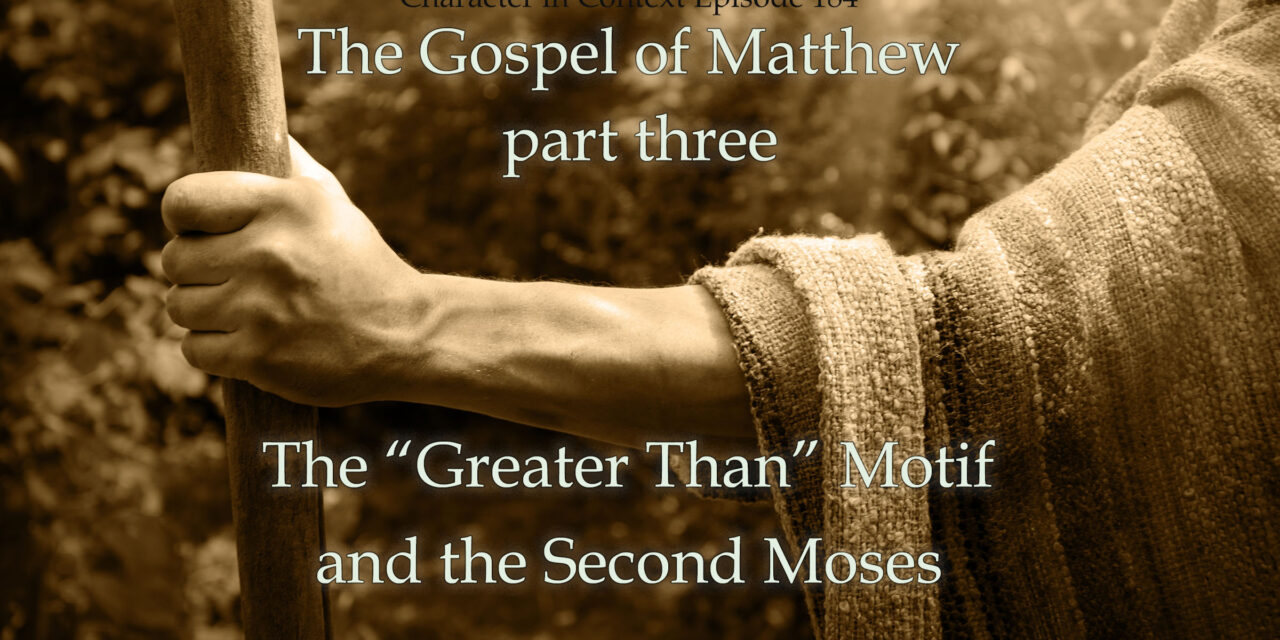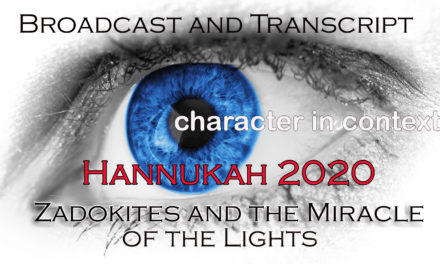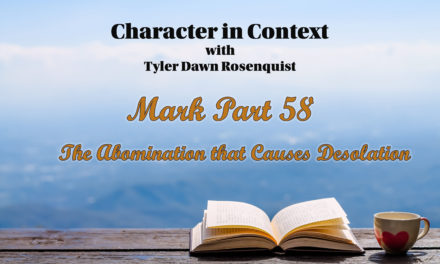A huge early theme of the Gospel of Matthew that carries throughout is the portrayal of Yeshua as the latter and greater Moses. In addition to this, He also declares Himself to be greater than the Temple and a whole lot of other sacred cows of the first century. This week, we will investigate these claims and find out why they are so important to Matthew’s particular audience.
If you can’t see the podcast player, click here. If you prefer YouTube, click here.
Throughout the Gospel of Matthew, we see Yeshua/Jesus telling His audience that “something greater than this or that” is here. He outright claims to be greater than the Temple, Jonah, and Solomon. Through parables and teachings, He also makes it clear that He is greater than Moses, any interpretation of the Torah apart from His own, the Sabbath, sacrifices, paying Temple taxes, and King David. But, by far, the most obvious of these is the ongoing comparison to Moses—from his birth story to His role as a teacher far greater than Moses, who only prophesied about Yeshua but failed to enter into the Land because of his sin and rebellion. I will just be glossing over most of these as I will cover them in depth when I get to them in the series, but I want you to get a feel for what Matthew is saying here because it will be important from the very beginning.
Remember from last time, Matthew is a polemical text making the case to post-Temple Jews of why they should follow Yeshua instead of the Pharisees, who were growing in power after the destruction of the Temple and the subsequent ruin of the Sadducean high priestly family. Pharisaic Judaism was morphing into the Rabbinic Judaism of the Middle Ages but it wasn’t there yet, not by a long shot. Matthew is making the case that it is Yeshua who represents true Judaism, as opposed to the more mainstream Pharisees who (by and large) didn’t accept Yeshua as the long-awaited Messiah and therefore the only true teacher and arbiter of the will of God. In fact, during the second century, led by Rabbi Akiva (a former Gentile), they would side with Shimon bar Kochba in his temporarily successful rebellion against Rome, which disastrously led to the permanent expulsion of the Jews until the 7th century. But when Matthew was written, this was all in the future and the battle was on for which sect within Judaism would come out on top. Matthew obviously wanted the victor to be Yeshua so he had to make sure to make a strong case for it. To accomplish this for his Jewish audience of Jews evangelizing other Jews and proselytes, he had to make a clear case that Yeshua is greater than anyone in the Torah and also greater than the Torah, as Paul had also written decades earlier. In Galatians 2:21 and Romans 8, Paul explains that Torah was weakened by the sin of the hearers and unable to save or render a person truly righteous within. Although Yeshua was likely considered to be the living law, as were all ancient kings, that is a reflection of His unique position as the arbiter of justice and instruction in righteousness and not a way to make Him simply co-equal with the Torah, the five books of Moses or even the whole of the Hebrew Scriptures.
Hi, I am Tyler Dawn Rosenquist, and welcome to Character in Context, where I teach the historical and ancient sociological context of Scripture with an eye to developing the character of the Messiah. If you prefer written material, I have years’ worth of blogs at theancientbridge.com as well as my six books available on Amazon—including a four-volume curriculum series dedicated to teaching Scriptural context in a way that even kids can understand it, called Context for Kids. I also have two video channels on YouTube with free Bible teachings for adults and kids. You can find the links for those on my website. Past broadcasts of this program can be found at characterincontext.podbean.com, and transcripts for most broadcasts at theancientbridge.com. If you have kids, I also have a weekly broadcast where I teach them Bible context in a way that shows them why they can trust God and how He wants to have a relationship with them through the Messiah. All Scripture this week is from the CSB, the Christian Standard Bible, unless I say otherwise.
Let’s look at the collection of “greater than” verses as well as where Yeshua implicitly claims authority over and on all things held sacred by the Jewish world:
I tell you that something greater than the temple is here. (Matt 12:6)
The men of Nineveh will stand up at the judgment with this generation and condemn it, because they repented at Jonah’s preaching; and look—something greater than Jonah is here. (Matt 12:41)
The queen of the south will rise up at the judgment with this generation and condemn it, because she came from the ends of the earth to hear the wisdom of Solomon; and look—something greater than Solomon is here. (Matt 12:42)
For the Son of Man is Lord of the Sabbath. (Matt 12:8)
While the Pharisees were together, Jesus questioned them, “What do you think about the Messiah? Whose son is he?” They replied, “David’s.” He asked them, “How is it then that David, inspired by the Spirit, calls him ‘Lord’: The Lord declared to my Lord, ‘Sit at my right hand until I put your enemies under your feet’? “If David calls him ‘Lord,’ how, then, can he be his son?” (Matt 22:41-45)
“You have heard that it was said to our ancestors, Do not murder, and whoever murders will be subject to judgment. But I tell you… 27 “You have heard that it was said, Do not commit adultery. But I tell you… “It was also said, Whoever divorces his wife must give her a written notice of divorce. But I tell you… “Again, you have heard that it was said to our ancestors, You must not break your oath, but you must keep your oaths to the Lord. But I tell you… “You have heard that it was said, An eye for an eye and a tooth for a tooth. But I tell you… “(Matt 5:21-38, edited)
As Kevin said in Home Alone, I have to say to those who claim that Yeshua never claimed to be anything other than a normal human being, “You guys give up, or are you hungry for more?” Greater than Solomon, the wisest man who ever lived but who tore the Kingdom apart with forced labor to build palaces for his bevy of booty call beauties. Greater than Moses, who gave the law but made allowances for human hard-heartedness (Mark 10). Greater than the Temple, which was supposed to be inhabited by the presence of God but had been abandoned since the days of Ezekiel before the Babylonian conquest—even though God commanded Haggai and Zerubbabel to rebuild it and continue with the offerings. Greater than Jonah who preached to the Gentiles but out of a wrathful and bitter heart, wanting them to perish and afraid that God would have mercy if he obeyed. Greater than the Sabbath because He understands that Sabbath is a gift so that men and women could rest and not something burdensome that people need to be paranoid about breaking. Greater than David because, well, you know but also because David himself recognized that Messiah was his Lord. Greater than the Torah, because He can do what the Torah never could—allow for perfection through the circumcision of the heart. Torah still allowed the evils of the world while lessening them, according to Yeshua, but Yeshua made allowances for perfection and provided the only way to the New Creation life. Torah prophesied about Yeshua, and so it serves Him and not the other way around. We obey it as a starting place but Yeshua beckons us to strive for perfection and not be satisfied with treating the commandments like an inclusive “to do” list or to search them to see what we can get away with while still claiming to be “Torah Observant.”
Let me just say this—many people would rather be Torah observant (or at least pretend to be because so much of it is land, cultural, and Temple based that it is impossible) than to follow the Messiah because it is a heck of a lot easier. You can still do some nasty, selfish, and evil things to other people and claim to be obedient, but Yeshua strips away all our pretensions with the Sermon on the Mount and we are so aghast that we come up with reasons why He wasn’t really serious about putting us in danger. Folks, until the time of Constantine, the church took it seriously. But with a standing army comes less trust, more fear, and the desire to conquer, dominate and convert by force. The teachings of Yeshua were often pushed aside in favor of using examples from the OT out of context to justify war for pretty much any reason to the point that, today, we pick and choose our wars based on financial motives and other worldly concerns and call it good while referring to ourselves as a Christian nation. Last month, I saw people calling for the deaths of innocent Palestinians and even children to avenge what their terrorist political leadership has done. But if we are going to follow Yeshua, we need to pray for and bless our enemies and if we are to do that for actual enemies, we should do even more for those who are suffering right now because they were born into an impoverished terrorist state. They could be us, under different circumstances. Condemn evil. Condemn violence. But be careful not to become the types of people who would want a people group slaughtered wholesale just because their leadership wants to do that to Israel. As in the Bible, it was the leadership responsible for the death of the Messiah and not the regular folks. We are all products of environments that we never chose for ourselves.
But the good news is that Yeshua came, promoting Himself as greater than everything and everyone on earth. Greater than the wisdom and wealth of Solomon. Yeshua is greater than the prophet Jonah, who ran away from God’s will instead of diligently carrying His own Cross toward a terrible death. Yeshua is greater than the Temple, which had become a source of false security and national pride. Yeshua was the presence of God, without priestly mediation and go-betweens, with no buffer between Himself and humanity. Blessings flowed from Him as they were supposed to flow from the Temple, but no longer were due to corrupt leadership. Yeshua was greater than David, who became the sort of ancient Near Eastern king whom Samuel had warned the Israelites about. Yeshua was greater than Moses, putting Himself over and above Moses with the “but I say to you” statements after speaking the words of Moses. Sometimes He kept the traditions of His day and at other times, he utterly ignored them.
But before that, we have His origin story which is purposefully tied to Moses. A miraculous birth, unlike Moses, but followed by persecution from a modern-day Pharaoh in Herod who also killed Jewish baby boys. Journeys to and from Egypt to escape danger. Following the Spirit for forty days of temptation in the wilderness echoing the forty years of Moses following the Spirit in the wilderness where Israel was tempted and failed. A mountaintop sermon delivering the law of the Kingdom of Heaven. The division of Matthew into five sections echoing the five books of Moses. Yeshua is going to not only be compared to Moses but also to Israel. Yeshua will succeed in everything Israel failed. Yeshua will be the perfect Son of God—not the stiff-necked generation in the wilderness. This is the story Matthew is telling, post 70 CE when the nation is having to face another Temple destroyed due to what the Talmud later described as “gratuitous hatred” among the factionalized Jews (Yoma 9b). Follow Yeshua, who got it right, endured to death like the prophets of old, resisted temptation, and who was vindicated by God as the first raised permanently from the dead and who has been given all authority in heaven and on earth. Live in this radical way He showed us to live because doing things the Pharisaic way didn’t stop our Temple from being destroyed, our people slaughtered, and our nation scattered.
It is time for new leadership—true leadership. That’s the story Matthew is telling. Yeshua is the greater Israel, the greater Son, who did everything right and was killed for it by the leadership—and some of those leaders were Pharisees. Even if they didn’t cause the problem, they did nothing to stop it when the Sanhedrin met to consider the recommendation of the High Priest’s informal hearing the night before. Matthew didn’t even include Yeshua’s request that they be forgiven because they didn’t know what they were doing because to do so would weaken his argument. Yes, there is forgiveness for all who repent but Matthew was portraying the Pharisaic influence as to be avoided and not as forgiven.
Those are the things I want us to notice as we are going through this Gospel. Everything in it is designed to show Matthew’s fellow Jews, living either in or in close proximity to the Land, the way forward for true Judaism, the way of the Kingdom of Heaven, at their cultural crossroads after the destruction of the Temple.





















